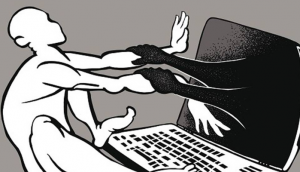Written by Noor Zahra Zamalik
When was the last time you like and comment your friends post in Facebook? ‘Hearted’ some pictures in Instagram? ‘Tweeted’ your comment in Twitter? Instant messaged via ‘Whatsapp’, ‘Snapchatted’ or ‘Wechat’? View a Youtube video? Indulged yourself with online games? or ‘Google-ing’ for ‘fact-checked’ of certain information? Was it a minute ago? an hour or sometimes today? Well, if you’re engaged with one of these terms, then you’re probably addicted in at least one of the social media platforms and will constantly use it over and over again.
It can’t be denied that social media has become an integral part of today’s world and we agreed that social media feed us with loads of information via internet as well as become very fabric upon the society. With technology evolving every minute, we will constantly changing information from each other all over the world as such social media provided us with access information as well as opinions that could expand our thinking and point of view.

Credit Image: Ashkan Rohani
However, some researchers agree that certain platforms may have positive impacts on mental health as the platforms help to enlarge the connections to exchange views whilst other researchers stated that the longer time a person spends on social media, the more he will suffer from mental health issues. Numerous studies had identified connections between social media and negative outcomes such as increased depression, loneliness, narcissism, and compulsive behavior. A study conducted, in 1995, a project namely The HomeNet has provided a computer and Internet for 93 households that previously have no Internet experience. The study found that the greater use of Internet by the community was associated with signs such as loneliness and depression on the initial year. In 2013, a study conducted based on Facebook usage among 1143 students has found that major depressive disorder, dysthymia, bipolar-mania, narcissism, antisocial-personality disorder, and compulsive behavior on the users.

Credit Image: Allison Abrams
There are few ways social media affects users’ mental health. The social media platforms can be addictive as a study found that when people stop using, they will undergo small but measurable psychological effects. People who are over-dependent on digital devices have the feeling of anxiety when they stop accessing social media. Social media also triggers more sadness and less well being as it linked to greater feelings of social isolation. A study conducts a research on eleven social media sites including Facebook, Twitter, Google, YouTube, LinkedIn, Instagram, Pinterest, Tumblr, Snapchat and Reddit and correlated this with ‘perceived social isolation’. Besides, the social media users tend to compare their lives with others which is mentally unhealthy. One of the reasons why social media sites make people feel socially isolated is the comparison factor. The user normally falls into trap of comparing himself to others when he scrolls other people feeds and making a judgment about how he is measured up. A study reveals that when we make comparison to other posts, in ‘upward’ or ‘downward’ directions – that is, the feeling that we’re either worse or better than our friends. Somehow, social media can also leads to jealousy-and a vicious cycle such as seeing other people’s tropical vacations or perfectly behaved kids or someone’s achievement in workplace or university. A researcher stated that social media user triggers the feelings of jealousy, he further added that jealous can make his or her life look better, and post jealousy-inducing his or her own photo, in an endless circle of one upping and feeling jealous.

Credit Image: Anna-Belle La Force
However, the unhealthy part of cycle is we keep coming back to social media even we know it doesn’t make us feel good. It is just like a drug as people still scroll to Facebook even he or she feels worse after using it as compared to people who are engaging in other activities. Apart from that, even if a person has many friends on social media, it doesn’t mean he or she is more sociable. A study found out that there seems to be a cap on the number of friends a person’s brain can handle as it takes an actual social interaction to build up a friendship. In conclusion, it is obvious that social media platforms provide us with many benefits such as it keeps us connected across the world, help us track back the long lost friends, provide us with adequate information without needed to look for hard copy references and so forth. However, people must also remember that it has potential to disturb our mental health.
Thus, social media is here to stay and it is a life changer. But, the next time you access the social media platforms to watch, generate, comment, share and engage, keep remind yourself on how far it would impacting your mental health.
References
Homewood Health Sante. (2017, Jan 20). The Dangers of Social Media on Your Mental Health. Retrieved from Homewoodhealth: https://www2.viu.ca/humanresources/documents/DangersofSocialMediaonYourMentalHealthQ12017.pdf
Pharma & Health Care. (2017, June 30). 6 Ways Social Media Affects Our Mental Health. Retrieved from Forbes: https://www.forbes.com/sites/alicegwalton/2017/06/30/a-run-down-of-social-medias-effects-on-our-mental-health/#2b3af0012e5a
Strickland, A. (2014). Exploring The Effects of Social Media Use on Mental Health of Young Adults. University of Central Florida Libraries, 4.